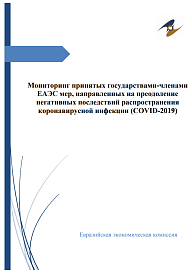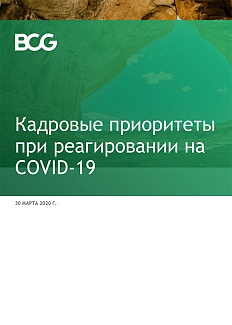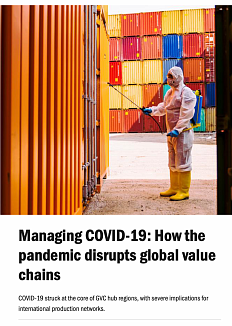The Eurasian Economic Commission has published an overview of measures taken by the EAEU countries to overcome the negative consequences of the spread of the coronavirus infection (COVID-19).
The Roscongress Foundation presents an overview of main measures of government support for businesses and the public in the EAEU countries. Each section is accompanied by fragments of broadcasts of relevant panel discussions from the business programme of international events held by the Roscongress Foundation.
This publication is regularly updated. This version is current as of 9 April 2020.
1) Overview of measures taken in the Republic of Armenia
The Republic of Armenia has taken a number of steps to prevent the spread of the coronavirus epidemic. In particular, the country introduced emergency regime starting from 16 March 2020.
To support the economy and neutralize the negative impact of the epidemic on the economy,
the Ministry of Economy of the Republic of Armenia prepared a package of support measures for small and medium-sized businesses in the following sectors:
· manufacturing,
· HoReCa,
· warehousing and transportation,
· tourism.
The measures are applicable to enterprises (organizations or individual entrepreneurs) operating on the territory of Armenia, excluding banks, credit institutions, pawnbrokers, and insurance providers. To qualify, the SME must have operated on the territory of Armenia for at least a year, and have a good credit history and no tax debt.
Businesses will be entitled to interest-free loans to finance salary payments and payroll taxes;
the government will subsidize banks that provide such loans. Also, the government will provide loans for procurement or import of raw materials (subject to a number of conditions).
2) Overview of measures taken in the Republic of Belarus
The Republic of Belarus has taken a number of steps to prevent the spread of the coronavirus. In particular, the country introduced self-isolation regime starting from 9 April 2020.
The country adopted a list of socially important goods with regulated prices. The list includes foods, hygiene products, individual protective equipment, and disinfectants.
The Ministry of Health of Belarus resolved to establish a charity account for financing sanitation and epidemic prevention measures and activities aimed at public health protection, in particular diagnosing and treating COVID-19 cases.
The country has adopted a comprehensive package of economic support measures related to monetary policy and prudential regulation, the real economy, and protection of the consumer market.
The Government of Belarus is acting in close collaboration with the European Union and international organizations to enhance the measures taken to counter the COVID-19 spread in Belarus. Most support measures are aimed at mitigating the negative effect on the real sector. These measures offer unprecedented opportunities for small and medium-sized businesses by providing access to regional financial instruments of the EU.
The package of measures adopted by the European Commission for the region of the Eastern Partnership includes a number of immediate steps and medium-term initiatives in addition to the EU collaboration programmes in each of the six states. Using the EU financing, the World Health Organization (WHO) will coordinate procurement and distribution of medical supplies, including on the territory of Belarus.
3) Overview of measures taken in the Republic of Kazakhstan
The Republic of Kazakhstan has taken a range of measures to prevent the spread of the coronavirus infection. In particular, the country introduced emergency regime starting from 16 March 2020.
A special WhatsApp account was created to help entrepreneurs promptly solve issues connected with phytosanitary measures and export/import of regulated goods during the quarantine. The account will function during the period of the emergency regime and the strict quarantine.
Starting from 1 April and until the year-end, customs duties for export of all types of oil products will be zeroed. A slump in oil prices caused by the OPEC+ deal collapse made Kazakhstani oil exports unprofitable. Furthermore, the emergency regime in Kazakhstan resulted in a sharp drop in domestic demand for oil products.
The country has set a limit on retail prices for food products which are socially important and essential for uninterrupted functioning of the economy.
In some regions, tariffs for some public utilities will be lowered starting from 1 April and for the period of the emergency regime. In particular, tariffs for water, heating, and energy were decreased by 3-5%.
Some steps were taken to create a favourable business environment. The procedure for obtaining financing on preferential terms for small and medium-sized businesses was simplified. Online services for receiving loan subsidies are available. The National Bank of Kazakhstan started implementing a loan subsidization program. Additional financing is channeled into spring agricultural works.
A newly developed Employment Roadmap is designed to become the primary tool for supporting employment. A large share of projects within the Roadmap are aimed at creating new jobs. Special attention is given to young specialists who lost their jobs. Local authorities are to establish mobile employment centers for giving new jobs to this social group.
4) Overview of measures taken in the Kyrgyz Republic
The Kyrgyz Republic has taken a range of measures to prevent the spread of the coronavirus infection. In particular, emergency regime was introduced starting from 22 March 2020.
Kyrgyzstan has received humanitarian supplies from the Government of China. The package includes substances for PCR testing and personal protection equipment for medical staff (disposable overalls, thermometers, protective goggles, gloves, and shoe covers). Earlier, the country received 21,000 COVID-19 rapid test kits.
At the moment, the set of economic support measures in Kyrgyzstan includes the following: 20% discount for Kyrgyz suppliers for public procurement; deferrals and possibility of payment in installments for tax and social contributions debts resulting from the emergency regime; extended deadlines for tax filings and financial statements; restrictions for field tax audits until 1 January 2021 (with some exceptions).
The Government of the Kyrgyz Republic adopted a resolution to temporarily allow supplying medicines and medical devices listed in the National Vital and Essential Drugs List without marketing authorization.
5) Overview of measures taken in the Russian Federation
The Government of the Russian Federation is taking active steps to prevent further spread of the coronavirus infection. Starting from 30 March and until 30 April 2020 the Government introduced ’non-working’ days (with full pay) for the majority of the population. Extra financing is allocated for purchasing mechanical ventilators, critical care ambulances, and regular ambulances to support high alert regime in medical institutions.
Starting from April and for a period of three months, medical specialists treating COVID patients will receive a monthly federal payment. Insurance guarantees for medical staff were raised.
All SMEs are eligible for a six months’ deferral of insurance contributions. A mechanism for repaying tax debts by installments during the next year was introduced. Tax debts are expected to arise after the end of the six months’ «tax holidays». SMEs can receive zero-interest loans for supporting employment.
The Government was instructed to compile clear lists of organizations which suspended their activities due to increased risks, while the work of other enterprises must be recommenced upon the condition of observing sanitary norms. The Government and the Central Bank are to promptly develop a program for providing additional support to businesses to help them maintain employment and revenues.
Public support includes the following emergency measures:
· all social payments and benefits are extended for the nearest six months;
· the unemployment benefit is increased from 8,000 to 12,000 rubles;
· no-penalty loan repayment holidays are introduced for all retail loans and mortgages, where the borrower’s income has decreased by more than 30 percent;
· families entitled to the ’maternal capital’ will be receiving additional payments in the next three months;
· until year end, the minimum sick leave payment is set at the minimum wage amount.
Due to deteriorating epidemiological situation, the Government has started to discuss mechanisms for automatic extension of validity of passports, driving licenses, and other identity papers for at least three months. A possibility of introducing «loan holidays» for all-purpose loans and mortgage loans is discussed.
For more information about policy responses to the coronavirus outbreak and possible ways to stabilize the economy during the pandemic, please see the COVID-19 and StayHomeEconomy special sections of the Roscongress information and analytical system.






